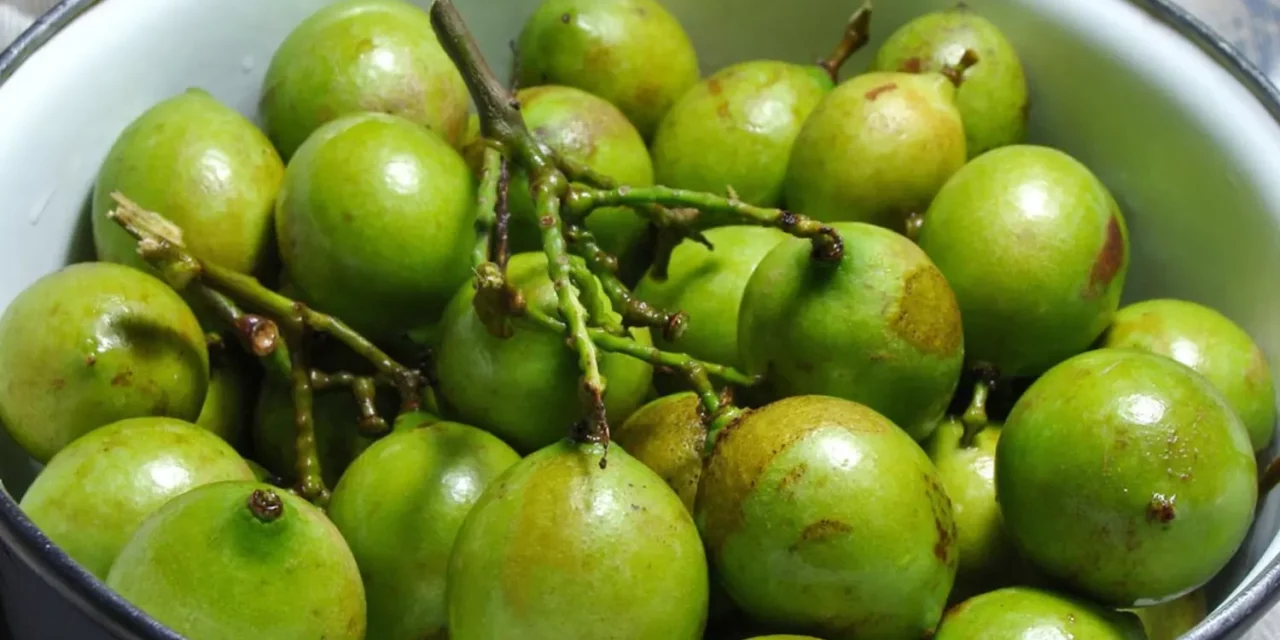Ever wondered if managing early-stage diabetes is as easy as grocery shopping? Turns out, it might just be! In a world where “The Best Green Fruit For Diabetics” symbolizes vitality and life while also offering improved diabetic control.
This article will take you on a journey through lush orchards and leafy greenhouses, uncovering some of nature’s hidden treasures. It explores fruits that are not only tangy, sweet, or refreshingly juicy but also provide incredible benefits for those managing diabetes.
Benefits Of Green Fruits
These fruits don’t just look pretty on your plate but also offer essential nutrients that can boost your health.
Nutrient-Rich
Let’s start with the superstar nutrient found in green fruits – fiber. Green fruits are rich in dietary fiber, which aids in digestion, promotes a feeling of fullness, and helps regulate blood sugar levels.
In addition, green fruits contain vitamin K, which plays a vital role in blood clotting and bone health. Furthermore, consuming these fruits provides an alternative source of this nutrient, reducing dependence solely on leafy greens. Moreover, green fruits boast abundant antioxidants such as vitamin C and E, which safeguard cells from damage and promoting healthy skin.
30 Green Color Fruits
Green fruits are diverse in flavors and nutrition. For instance, a Granny Smith apple has a crisp bite, while a kiwifruit offers tropical sweetness. These fruits not only tantalize taste buds but also pack a nutritional punch. Here are some examples of green fruits to explore:
1. Green Apples
Crisp and tart, green apples are a refreshing treat rich in fiber and antioxidants. Perfect for snacking or adding a tangy twist to salads and desserts.
2. Kiwi
With its fuzzy brown skin and vibrant green flesh speckled with tiny black seeds, kiwi is bursting with vitamin C and dietary fiber. Its sweet and tangy flavor makes it a delightful addition to fruit salads or smoothies.
3. Avocado
Creamy and versatile, avocados are packed with healthy fats, fiber, and an array of vitamins and minerals. Additionally, you can enjoy them sliced on toast, blended into guacamole, or added to salads for a nutritious boost.
4. Green Grapes
Green grapes are a popular snack choice and can also be used to make refreshing juices or wine. They are low in calories and high in antioxidants, making them a guilt-free indulgence.
5. Honeydew Melon
Honeydew melon is sweet, succulent, and has a pale green flesh with a refreshing flavor that reminds you of summer. Enjoy it chilled as a hydrating snack or add it to fruit salads for a burst of freshness.
6. Limes
Limes are tart and zesty, adding a bright burst of flavor to dishes and beverages. Rich in vitamin C, they are often used to make refreshing limeade, cocktails, or to enhance the flavor of savory dishes.
7. Green Pears
Smooth-skinned and subtly sweet, green pears are high in fiber and vitamin C. Enjoy them fresh as a snack or sliced into salads for a crisp texture.
8. Green Bananas
Firmer and starchier than their yellow counterparts, green bananas are rich in resistant starch, which may support digestive health.
People often use them in savory dishes or cook them into chips.
9. Green Plums
Also known as greengages, these small, round fruits have a tart, yet sweet flavor and a vibrant green skin. One can enjoy them fresh or use them to create jams and preserves.
10. Green Figs
Figs come in various colors, including green, and are prized for their sweet and chewy texture. They are rich in fiber and antioxidants; green figs are delicious when eaten fresh or dried.
11. Green Peaches
Crisp and slightly tart when unripe, green peaches soften as they ripen and develop a sweet flavor. They are high in vitamins A and C, making them a nutritious addition to fruit salads or desserts.
12. Green Pluots
A cross between plums and apricots, green pluots offer a unique blend of sweet and tart flavors. They’re high in vitamins and minerals, perfect for snacking or baking into pies and tarts.
13. Green Oranges
While less common than their orange counterparts, green oranges have a tangy flavor and are rich in vitamin C. You can juice or use them to make marmalades for a refreshing twist.
14. Green Papaya
Often used in Asian cuisine, green papaya has a crunchy texture and a mild flavor. It is commonly used in salads, curries, or pickled for a tangy condiment.
15. Green Guava
Fragrant and tropical, green guava is beloved for its sweet and slightly tangy flavor. It is rich in vitamin C and dietary fiber, making it a nutritious snack or addition to fruit salads.
16. Green Lychee
Similar to traditional lychee but with a green outer skin, green lychee has a delicate sweetness and floral aroma. It can be eaten fresh or added to cocktails for a tropical twist.
17. Green Passionfruit
Tart and aromatic, green passionfruit is prized for its unique flavor and culinary versatility. You can use it to make juices, desserts, or as a topping for yogurt and ice cream.
18. Green Plums
With their crisp texture and mildly sweet flavor, green plums are a refreshing snack and a good source of vitamin C. They can also be pickled or used to make jams and preserves.
19. Green Gooseberries
Tangy and slightly tart, green gooseberries are often used in pies, crumbles, and jams. They are high in vitamin C and antioxidants, making them a nutritious addition to baked goods.
20. Green Olives
Briny and slightly bitter, green olives are a staple in Mediterranean cuisine. They can be enjoyed on their own as a snack or used to add flavor to salads, pasta dishes, or pizzas.
21. Green Mulberries
These small, juicy berries have a mildly sweet flavor and are packed with vitamins and antioxidants. Enjoy them fresh or dried as a nutritious snack or added to baked goods.
22. Green Cherimoya
Also known as custard apple, green cherimoya has a creamy texture and a sweet flavor reminiscent of vanilla and banana. It is often eaten fresh or blended into smoothies and desserts.
23. Green Jujube
Sweet and crisp, green jujubes find common use in Asian cuisine and traditional medicine. They are enjoyed fresh, dried, or cooked into soups and stews for a natural sweetness.
24. Green Starfruit
Shaped like a star and with a tangy flavor, green starfruit is rich in vitamin C and antioxidants. Enjoy it sliced for a refreshing snack or added to salads and salsas for a tropical twist.
25. Green Tomatillo
In Mexican cuisine, chefs commonly use green tomatillos for their tart flavor, incorporating them into dishes like salsa verde or cooking them into sauces and stews.They add a bright, zesty flavor to dishes.
26. Green Sour Cherries
Prized for their intense flavor and culinary versatility, green sour cherries add a tart and tangy taste to dishes. Cooks use them to make pies, jams, or incorporate them into savory dishes for a pop of acidity.
27. Green Sapote
Also known as mamey sapote, green sapote has a creamy texture and a sweet flavor reminiscent of sweet potato and almond. It’s often eaten fresh or blended into smoothies and desserts.
28. Green Miracle Fruit
Small and bright green, miracle fruit has a unique ability to temporarily alter taste perceptions, making sour foods taste sweet. It finds common use as a natural sweetener or as a standalone treat due to its intriguing flavor-changing properties.
29. Green Feijoa
With its tangy flavor and aromatic aroma, green feijoa is commonly used in jams, jellies, and desserts. It is rich in vitamin C and dietary fiber, making it a nutritious addition to baked goods.
30. Green Pawpaw
Similar to papaya but with a milder flavor, green pawpaw has a creamy texture and a subtly sweet taste. It is often eaten fresh or blended into smoothies for a tropical treat.
Green Fruit Nutritional Comparison
Below, we peek into a nutritional chart of 30 green fruits per 100 grams, offering insights into their calorie content, carbohydrate composition, fiber content, and more.
| Fruit | Calories | Carbohydrates (g) | Fiber (g) | Sugars (g) | Protein (g) | Fat (g) | Vitamin C (mg) | Vitamin A (IU) | Antioxidants |
| Green Apples | 52 | 14 | 2.4 | 10 | 0.3 | 0.2 | 4.6 | 54 | Moderate |
| Kiwi | 61 | 14.7 | 3 | 9.5 | 1.1 | 0.5 | 161 | 0 | High |
| Avocado | 160 | 9 | 7 | 0.7 | 2 | 15 | 14.6 | 1466 | High |
| Green Grapes | 69 | 18.1 | 0.9 | 15.5 | 0.7 | 0.2 | 2.3 | 66 | Moderate |
| Honeydew Melon | 36 | 9 | 0.8 | 8.1 | 0.5 | 0.2 | 18 | 1126 | High |
| Limes | 30 | 10.5 | 2.8 | 1.7 | 0.7 | 0.2 | 29.1 | 30 | High |
| Green Pears | 57 | 15 | 3 | 9.8 | 0.4 | 0.1 | 4 | 0 | Low |
| Green Bananas | 89 | 22.8 | 2.6 | 17.1 | 1.1 | 0.3 | 8.7 | 64 | Moderate |
| Green Plums | 46 | 11.4 | 1.4 | 9.9 | 0.7 | 0.3 | 9.5 | 345 | High |
| Green Figs | 74 | 19.2 | 2.9 | 16.3 | 0.8 | 0.3 | 2 | 142 | High |
| Green Peaches | 39 | 10.1 | 1.5 | 8.4 | 0.9 | 0.3 | 6.6 | 326 | Moderate |
| Green Pluots | 45 | 11.4 | 1.4 | 9.9 | 0.7 | 0.3 | 9.5 | 345 | High |
| Green Oranges | 43 | 8.2 | 1.4 | 8.2 | 0.7 | 0.2 | 50 | 1350 | High |
| Green Papaya | 43 | 10.8 | 1.7 | 7.8 | 0.5 | 0.3 | 62 | 1030 | High |
| Green Guava | 68 | 14.3 | 5 | 9 | 2 | 1 | 228 | 624 | High |
| Green Lychee | 66 | 16.5 | 1.3 | 15.2 | 0.8 | 0.4 | 71 | 0 | Low |
| Green Passionfruit | 97 | 23.4 | 10.4 | 11.2 | 2.2 | 0.7 | 30 | 1275 | High |
| Green Plums | 46 | 11.4 | 1.4 | 9.9 | 0.7 | 0.3 | 9.5 | 345 | High |
| Green Gooseberries | 44 | 10 | 4.3 | 7.9 | 1 | 0.6 | 10 | 0 | High |
| Green Olives | 115 | 6 | 3.3 | 0 | 1 | 10.7 | 0.9 | 146 | High |
| Green Mulberries | 43 | 9.8 | 1.7 | 8.1 | 1.4 | 0.4 | 10 | 2 | High |
| Green Cherimoya | 75 | 17.7 | 2.3 | 14.7 | 1.6 | 0.6 | 19.7 | 0 | High |
| Green Jujube | 79 | 20.2 | 4.1 | 17.1 | 1.2 | 0.2 | 69 | 0 | High |
| Green Starfruit | 31 | 6 | 2.8 | 3.9 | 1.1 | 0.2 | 34.4 | 0 | High |
| Green Tomatillo | 32 | 5.8 | 2.8 | 3.9 | 1.1 | 0.2 | 10.6 | 734 | High |
| Green Sour Cherries | 50 | 12.2 | 1.6 | 8.3 | 1.1 | 0.3 | 7 | 1450 | Moderate |
| Green Sapote | 81 | 18.6 | 1.1 | 14.9 | 2.3 | 0.9 | 30 | 141 | Moderate |
| Green Miracle Fruit | 25 | 5 | 2 | 2 | 1 | 0 | 0 | 0 | Low |
| Green Feijoa | 60 | 15.1 | 6.4 | 8.1 | 1.1 | 0.6 | 48.9 | 0 | High |
| Green Pawpaw | 43 | 10.9 | 1.7 | 7.8 | 0.5 | 0.3 | 62 | 1030 | High |
Portion Control and Glycemic Impact
Portion control of these green fruits is crucial for individuals managing diabetes and aiming for weight management. Additionally, green fruits like apples and kiwis have a low glycemic index, meaning they release sugar into the bloodstream gradually. This slow release contributes to prolonged feelings of fullness and satisfaction, preventing sudden spikes in blood sugar levels.
For individuals managing diabetes and aiming for weight management, including these low glycemic index fruits in their diet can be advantageous. They can enjoy the natural sweetness of fruits without experiencing rapid fluctuations in blood sugar, which supports better glycemic control and helps in achieving weight management goals.
Importance Of Balancing Variety In The Diet
Ensuring a diverse range of green fruits in the diet is crucial for individuals managing diabetes. These fruits, with their low glycemic index and rich nutrients, are key in regulating blood sugar levels and boosting overall health.
Incorporating varieties like kiwi, avocado, and green apples provides vital vitamins, minerals, and antioxidants that support bodily functions and combat diabetes effects. Furthermore, their dietary fiber aids digestion, promotes satiety, controls appetite, and helps manage weight—significant factors in diabetes care. A diet abundant in such fruits do not only stabilizes blood sugar but also fosters a holistic, nutritious approach to diabetes management and well-being.
The Best Green Fruit For Diabetics
Weighing the nutritional chart of all the green fruits, it is safe to say that the best fruit for diabetics goes to Avocados. There are multiple reasons to back up its status including:
- Rich in heart-healthy fats
Avocados contain monounsaturated fats, which can help improve heart health and lower the risk of cardiovascular disease, a common complication of diabetes.
- High in fiber
Avocados are a good source of dietary fiber, which aids in digestion, promotes a feeling of fullness, and helps regulate blood sugar levels.
- Low glycemic index
With a low glycemic index, avocados have minimal impact on blood sugar levels when consumed in moderation, making them suitable for diabetes management.
- Nutrient-dense
Avocados are rich in essential vitamins and minerals. These include potassium, vitamin K, folate, and vitamin E, which support overall health and well-being.
- Versatile
Avocados offer various enjoyable ways to enhance meals, from slicing them on toast to mashing them into guacamole or adding them to salads and smoothies, providing a creamy and satisfying addition.
Final Thoughts
Green fruits aren’t just tasty treats; they’re your friends in the fight against diabetes. Doesn’t matter if you’re enjoying the creamy goodness of avocado or the tangy burst of kiwi, these fruits offer a delicious way to keep your blood sugar in check and your body thriving. Next time you’re at the store, pick up some green goodness and enjoy the taste of a healthier lifestyle!










